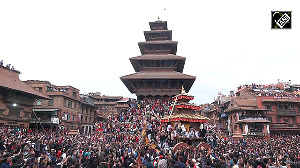'Bhutto feared elements of the so-called establishment, including people linked to the intelligence services. She highly distrusted individuals like Hamid Gul who -- she was convinced -- maintained active ties with jihadists.' Heraldo Munoz, author of the sensational new book, Getting Away With Murder, tells Rediff.com's Vicky Nanjappa in an exclusive interview.
 Who ordered Benazir Bhutto's assassination, which occurred six years ago this December?
Who ordered Benazir Bhutto's assassination, which occurred six years ago this December?
Was it former Pakistan army chief-turned-president Pervez Musharraf, whom the late Pakistan People's Party leader had mentioned in an e-mail?
Or were it elements within the Pakistani establishment who wanted her dead?
A sensational new book, Getting Away With Murder, by Heraldo Munoz, an investigator on the United Nations-led team that probed the political assassination, claims that Bhutto feared elements of the Pakistani establishment, including people linked to the intelligence services.
Munoz spoke to Rediff.com's Vicky Nanjappa in an exclusive interview.
Why was no action taken on Benazir Bhutto's letter to then President Pervez Musharraf about a life threat?
Bhutto denounced three close associates of Musharraf as posing a clear threat to her security -- former ISI director general Hamid Gul, Intelligence Bureau chief Ijaz Shah, and then Punjab province chief minister Arbab Pervaiz Elahi. She then added a fourth person in the list.
The Musharraf government considered Bhutto's letter as purely political and did not lend credence to it.
What is more surprising is that the police never approached or interrogated the individuals mentioned in that letter.
One of them, Hamid Gul, expressed surprise that the investigators never questioned him in the assassination case.
You believe Al Qaeda ordered the assassination and the Pakistan Taliban executed it. What exactly was Musharraf's role?
Musharraf, in a conversation he had with Bhutto, had warned her that her security depended on the state of their mutual relationship.
Benazir sent an e-mail to (CNN journalist Wolf Blitzer -- to be released only if she were to be killed -- where she affirmed that she would 'hold Musharraf responsible' for her death because she had been 'made to feel insecure by his minions.'
Any penal responsibility has to be established in a court of law. But Musharraf had the political responsibility to effectively protect a former prime minister who faced clear threats, and he did not.
Could the United States and United Kingdom have done more considering they prompted her return?
Perhaps! Benazir was disappointed that the US and UK governments had not pressurised Musharraf more forcefully to provide her with adequate security, particularly since they had stimulated her return in order to stabilise Pakistan.
The US embassy in Islamabad recommended the use of private security contractors, but Benazir was upset that the US had been unwilling or unable to persuade Musharraf from denying her the use of armed security, or give her the security she was entitled to as a former prime minister.
How has Pakistan changed since her death?
Pakistan has witnessed for the first time a civilian elected government completing its five-year term and handing over power to another democratically-elected government -- that of Nawaz Sharif. This is encouraging.
Benazir's assassination may have marked a turning point in a popular demand for tangible strides in democratic governance, socio-economic development and the repudiation of violence and terrorism.
The country still has major development challenges that Benazir wanted to address.
She's gone, but her dreams and aspirations are not.

Do you think there will be a fair trial in Pakistan?
I hope so. An anti-terrorist court in Rawalpindi, using the UN Commission of Inquiry report, opened an investigation into the Bhutto assassination, prosecuting and then arresting the local police authorities in charge of protecting Bhutto.
It also indicted Musharraf in a case that is still going on.
Adding to the mystery in the Bhutto case, state prosecutor Chaudhry Zulfikar Ali was assassinated in May 2013 as he was driving to work for a hearing on the Bhutto case.
What role do you think the ISI played in this assassination?
That's for the Pakistani courts to determine.
What is clear, however, is that Bhutto feared elements of the so-called establishment, including people linked to the intelligence services.
She highly distrusted individuals like Gul who -- she was convinced -- maintained active ties with jihadists.
After the Karachi bomb attack against her, hours after landing in Pakistan from exile, she denounced a larger conspiracy involving 'elements from within the Pakistani intelligence service.'
Was there was no autopsy conducted after her death?
No, there was no autopsy conducted despite the fact that after Benazir was declared dead -- on three different occasions -- the doctor in charge at the hospital asked Rawalpindi police chief Saud Aziz for permission to conduct the procedure, which he was denied.
According to Pakistani law, the responsibility for initiating a post mortem examination falls on the police, not the hospital authorities.
In your book you say that Musharraf and Bhutto had struck an inconclusive deal for her return. Despite no formal agreement, what prompted her to return to Pakistan?
Despite many conversations between Bhutto and Musharraf, a complete deal was never reached. Yet, she returned because she felt she had to campaign on the ground to ensure her party's electoral victory.
Benazir knew the risks and threats that loomed over her, but found that there was no other way but to return to her homeland to lead a process of democratic recovery.
Will Benazir Bhutto's assassination always remain a mystery?
It may. If John F Kennedy's assassination in Dallas 50 years ago still raises controversy and is surrounded by doubts and mystery, I imagine that may also happen with the murder of Benazir Bhutto.
How has your book been received?
The book has just been just released, but it has been very well received. Specialised journals like Kirkus and Library Journal have hailed it as an 'eye-opening political expose' and 'readable and riveting'.






 © 2025
© 2025